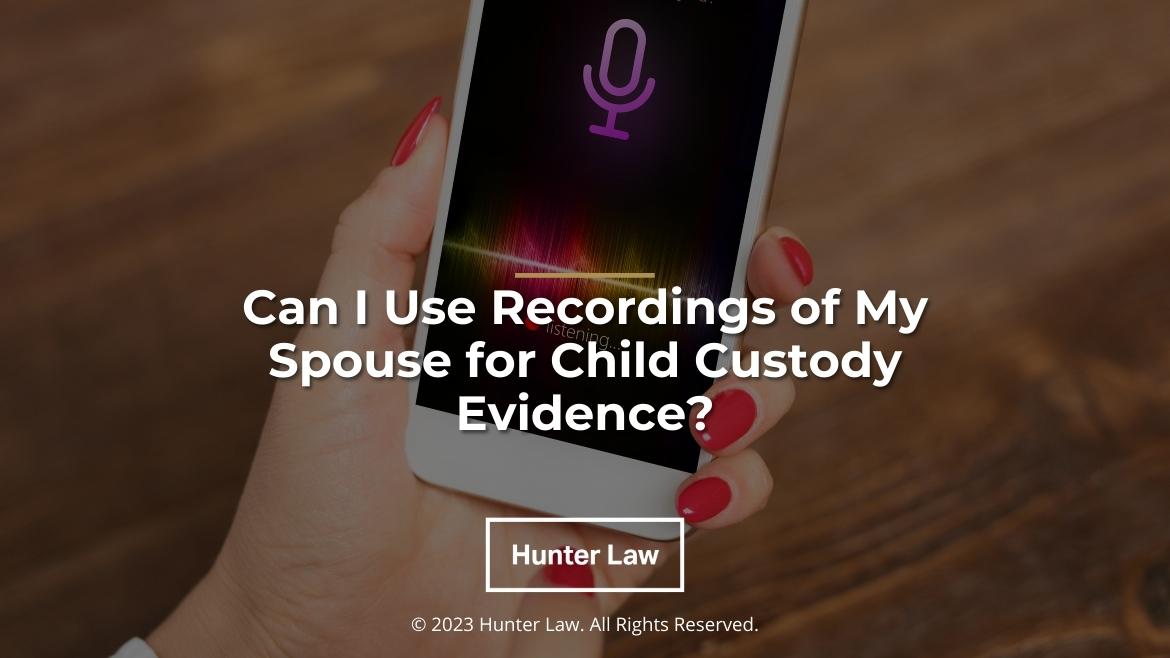In any divorce case, child custody is one of the most important matters to settle. One or both parents may want primary custody or have different ideas about what’s best for their children. Because emotions are high, you might be tempted to secretly record your spouse and try to use it as evidence against them for child custody purposes. That’s always a bad idea, however. Let’s take a closer look at whether you can use recordings of your spouse for child custody evidence and explore why you should never record your spouse without their consent.
Florida’s Laws About Recorded Evidence
In a nutshell, Florida is an “all-party” state. This means that all the parties in a given conversation or interaction must be aware that they are being recorded for a recording of that interaction to be admissible in court. They must also consent to be recorded for the recording to be admissible.
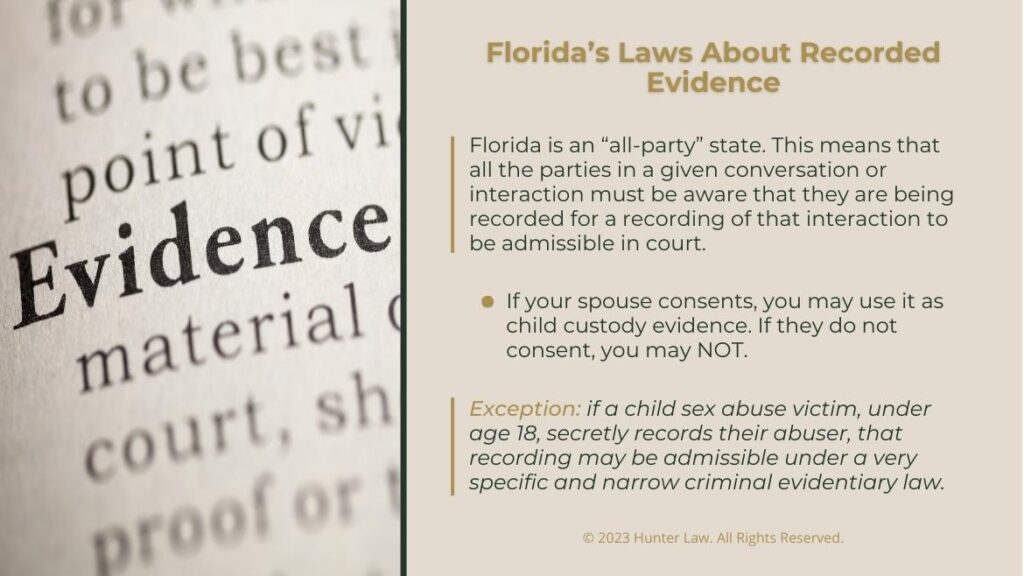
Here are two examples to demonstrate this law in action:
- You and your spouse have a conversation about child custody. You wear a recording device beneath your clothes and your spouse has no idea that the conversation is being recorded. Afterward, you try to present the recording to the judge as evidence in your child custody case. But because your spouse was not aware of the recording, it is inadmissible as evidence.
- You and your spouse have a conversation about child custody, and both of you agree to record the other so that neither can misrepresent the other in court. This evidence is admissible in a child custody case since both of you were aware of the recording and consented to it.
Bottom line: if your spouse consents to be recorded, you may use it as child custody evidence. If your spouse does not consent to be recorded or is unaware of being recorded, you may not.
There is an exception, for child sexual abuse victims under the age of 18: if the victim secretly records their abuser making statements, that recording may be admissible under a very specific and narrow criminal evidentiary law.
What if the Recording Is of Child Abuse or Serious Behaviors?
It doesn’t matter as far as the law is concerned. Even if the recording in question showcases very concerning behavior, like child abuse, you can’t use the recording in court for any sort of evidence if your spouse was not aware that they were being recorded (so, by default, they could not consent to be recorded, either). The only exception would be the one described above, if the child victim makes the recording.
This can be devastating and worrying for parents who believe that their spouse may be abusing their child. But there are other types of evidence you can use and submit to the court to secure custody of your child. Knowledgeable family law lawyers can assist, so contact Hunter Law today.
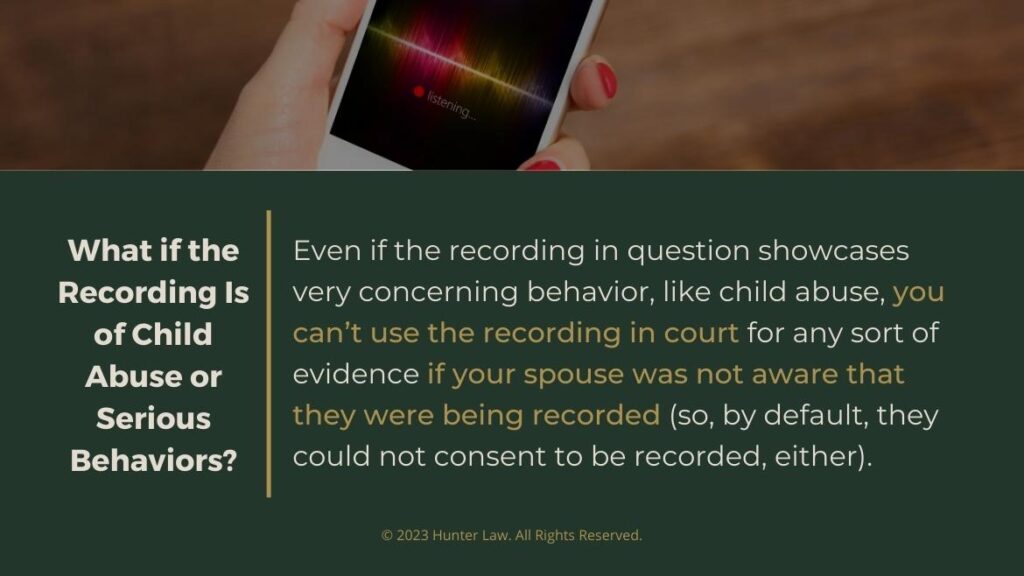
When Can Recordings Be Used as Evidence in Child Custody Cases?
In Tampa child custody cases, you can only use recordings of your spouse in two circumstances.
Both Parties Consent to Recording
In the first circumstance, both parties in the conversation consent to being recorded and sharing the recordings with each other. Like in the above example, if you and your spouse agree to be recorded for the purposes of honesty and transparency, any evidence in the recording can be submitted to the court. This is more likely if you and your spouse are having an amicable divorce.
You Receive a Recording from Your Spouse
However, you may submit evidence that you receive from your spouse, even if it’s a recording of information that is harmful to their case. This is a very rare and unlikely scenario, but here’s an example so you can fully understand it.
Imagine that you receive an email from your spouse. In the email, there’s an embedded attachment that leads to a sound file. It’s a recording of your spouse. They recorded themselves for whatever reason, and the recording includes evidence that you can use in your child custody case.
Even if your spouse did not intend to send the recording to you, you may use the recording as evidence. That’s because, if the recording originated from your spouse, they consented to it by default. The fact that you received it by accident doesn’t change the fact that the evidence in the recording is admissible.
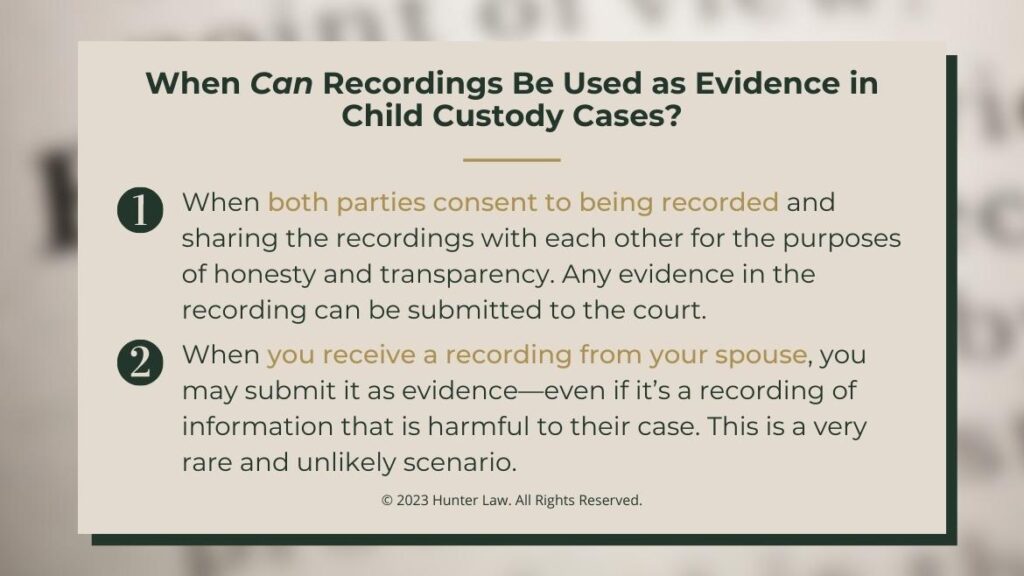
Other Types of Inadmissible Evidence
While it is possible to use recordings of your spouse for child custody evidence, there are other types of inadmissible evidence you should be aware of to avoid damaging your Tampa child custody case.
First, any illegally obtained electronic recordings or data may not be admitted to court. For instance, if you steal your spouse’s phone and download the text messages or emails to be used as evidence in your child custody case, none of that evidence will be admissible.
Similarly, if you install keylogger software or other software to spy on your spouse’s computer or devices, that electronic evidence will be inadmissible in court. The same consent rules for recording apply for all digital communications and information; your spouse has to be aware and consent to you using the information for it to be valid.
In addition to the recordings being inadmissible, it is possible that by making the recording the person committed a felony under state law. And, it may be an additional felony each time the person who made the recording sends the recording to anybody else.
What if you heard something that could be damaging to your spouse’s Tampa child custody case? Unfortunately, this is usually considered to be “hearsay” in court. While it may be admissible, it will not likely sway a judge in a child custody case to your side. Hearsay can be misinterpreted, misunderstood, or deliberately falsified, so it’s not given a lot of weight in legal scenarios and settings.
Read more in our blog: 5 Things to Consider Before You Hire a Divorce Family Law Firm in Tampa, Florida
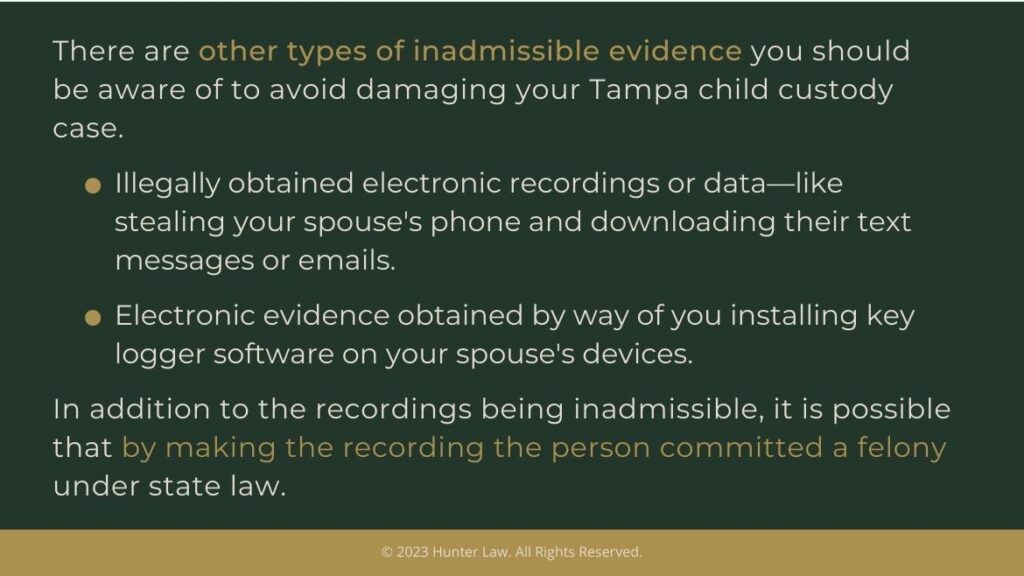
Contact Hunter Law Today
Even though you can’t record your spouse without their consent and thus can’t normally use recordings of your spouse for child support, there are ways to sway the case in your favor. Knowledgeable divorce lawyers can help you gather legally admissible evidence and strengthen your case in more ways than one.
At Hunter Law, our knowledgeable legal representatives have helped Tampa families like you through this difficult time. If you have questions about child custody or want the legal support you need to ensure a positive outcome, we can help. Contact us today for a free consultation and more information.


